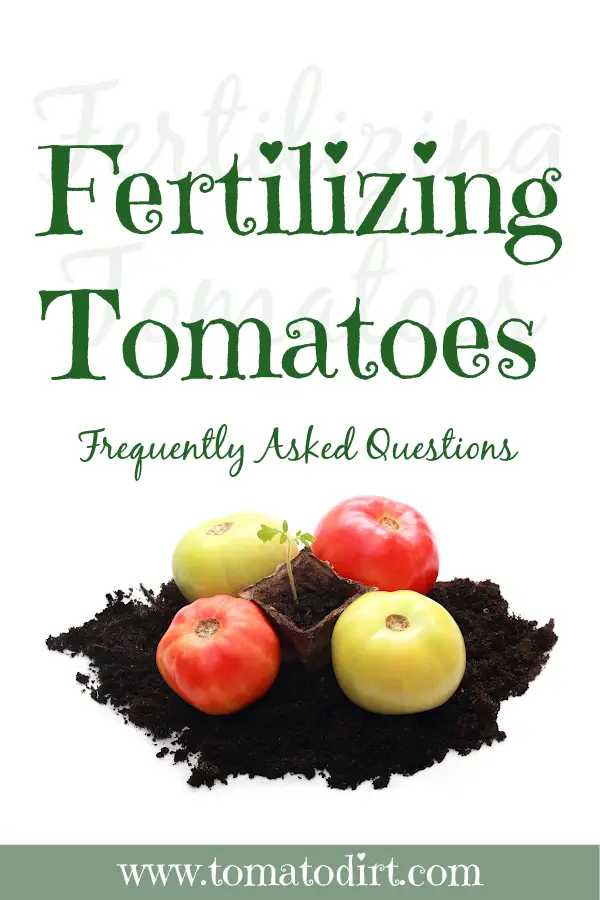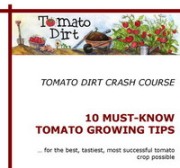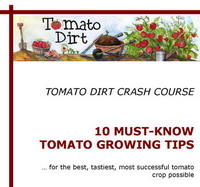FREE: 10 Must-Know Tomato Growing Tips Get The Guide
Read our affiliate disclosure here.
Fertilizing Tomatoes: Frequently Asked Questions
Since 2010, Tomato Dirt has garnered 4.8+ million views, making it the web’s leading online source for growing tomatoes in the home garden. Award-winning writer and Tomato Dirt owner Kathy Widenhouse has helped thousands of home gardeners grow healthier tomatoes. Be one of them when you get Tomato Dirt’s Growing Guide here.
Updated 5.2.24
Tomatoes need lots of nutrients. That’s one reason fertilizing tomatoes is a key step in growing healthy plants.
If you wonder why tomato plants need so many vitamins and minerals and other good stuff in the soil, think about what a tomato plant accomplishes in a very short time.
- A tomato seed uses nutrients from its carry-along seed packet to sprout and put out its first leaves.
- The tiny seedling works hard to use water and sunshine by extending its stem up to the light and putting out extra sets of leaves.
- Seedlings are transplanted to bigger pots. The lucky ones are fed a bit of extra nutrients.
- Plants are placed in a nutrient-rich home in your garden, enriched by compost, and go into overdrive. They push up leaves and branches and blossoms with the ultimate goal of creating fruit.
- The process continues for a few weeks or months as the plants work to produce as many fruits as possible. All those tomatoes will allow plants (and variety) to survive … because fruit produces seeds.
Tomatoes need lots of nutrients to accomplish all that activity within six months or so. Their growing process is compressed into a short period of time. And it is the reason that fertilizing tomatoes plays a significant role in your tomato plant’s success.

Fertilizing Tomatoes FAQs
Q. How do you know when tomatoes need fertilizer?
The fact is that even the healthiest soil may not have adequate nutrients for tomato plants. Most tomatoes need fertilizer – even if it’s simply an added layer of compost worked into the soil at the beginning of the growing season. Conduct a soil test in your garden to find out what kinds of nutrients to add to your garden to give your tomatoes the best chance to flourish.
Q. What is the best fertilizer for tomatoes?
Fertilizers are a combination of the three nutrients commonly fed to plants: nitrogen, phosphorus, and potassium (referred to as the “N-P-K ratio”). The three numbers on a fertilizer package represent the proportion of three nutrients.
- Nitrogen encourages leaf growth (rather than blossoming or fruit development.) A higher nitrogen number indicates a fertilizer best used at the beginning of the growing season, when plants are working hard to get established by putting out foliage. A lower nitrogen number (with higher phosphorus and potassium numbers) can benefit tomatoes in mid- to late season when blossoming and fruiting is at its peak.
- Phosphorus, the second number in the N-P-K ratio, encourages flowering, and therefore fruiting – clearly a good benefit for tomato plants.
- Potassium (the “K” in the ratio) encourages fruit development. A The strong third number in fertilizer indicates that it will help tomato plants produce healthy, quality fruit.
You can use various tomato fertilizers at different points in the season. Or you can keep things simple with a fertilizer especially formulated for tomatoes, like Miracle-Gro Tomatoes (18-18-21), a crystal formula mixed with water and applied through a hose or sprayer … and Tomato Tone (4-7-10 or 3-4-6), a granular organic fertilizer that is worked into the soil.
Q. How can I know whether or not I’m over fertilizing tomatoes?
When you over-fertilize young tomato plants they grow tall and spindly, with plenty of leaves but few blossoms. Reason? Too much nitrogen, which encourages foliage development.
But you can also recognize that you’re over fertilizing tomatoes mid-season when …
- Tomatoes remain mostly green
- Tomatoes turn red from the bottom up but do not fully ripen
- Inner fruit contains a hard core center, either brown or white, and is stringy and tough
- The plant’s roots get burned and the plant is stunted
More about fertilizing tomatoes
What Nutrients Do Tomatoes Need?
How to use tomato fertilizer to get the best tomato production...
Kinds of tomato fertilizer ...
Organic tomato fertilizer: advantages and disadvantages...
Epsom salts: a natural tomato fertilizer ...
Does tomato fertilizer potency stay strong over time?
Tomato fertilizer question: will this fertilizer work for tomatoes?
See more on our Fertilizing Tomatoes Pinterest board...
Return from Fertilizing Tomatoes FAQs to Tomato Dirt home
As an Amazon Associate and Rakuten Advertising affiliate I earn from qualifying purchases.
SHARE THIS PAGE:
FREE! 10 Must-Know Tomato Growing Tips: 20-page guide
Get yours here:



